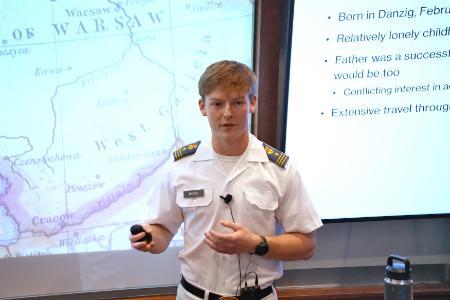Honors Week: Why Live? Cadet Researches Philosopher’s Personal Resilience

LEXINGTON, Va. April 3, 2025 — Simon Moore ’25 was drawn to Arthur Schopenhauer’s pessimistic views and honesty about pain and suffering. He said it might be considered a taboo subject, but it intrigued him.
He presented his thesis, “Why Live?: An Analysis of Arthur Schopenhauer’s Life and Philosophy,” during Virginia Military Institute’s Honors Week. The psychology major decided to commit his time outside his department to a philosophy-focused thesis. 
“There's not really a lot of opportunity to read and learn about philosophy,” Moore admitted. “That was something that I kind of wished that I had.”
He essentially willed that and was allowed to pursue the topic of Schopenhauer’s life due to his desire to explore something more reading and writing intensive — something he hadn’t really done during his cadetship.
Moore’s thesis explored why Schopenhauer, despite his pessimistic life and work, did not commit suicide, focusing on his denial of the will through art, philosophy, compassion, and detachment. He analyzed Schopenhauer's life, including his daily routine, his relationships, and his philosophical pursuits, to determine if he lived up to his own ideals.
The research involved extensive reading and writing, with a focus on understanding Schopenhauer as a man and the alignment of his life and work.
Moore pointed out Schopenhauer's philosophy offers four key principles for personal resilience: art and aesthetic pleasures, philosophical thinking and reading, compassion, and detachment.
In his thesis, Moore emphasizes that these principles are always available, regardless of life's circumstances. They provide tools for maintaining perspective and finding meaning, even during personal struggles. The core idea is to consciously choose how to respond to suffering — through art, reflection, compassion, and detachment — rather than being overwhelmed by life's challenges.
He began his research last spring, spending about four to five hours a week on reading materials. That amped up in the fall and this spring to about eight to 10 hours a week of research. By February, he was writing his thesis in full force.
Moore said that this research opportunity allowed him to diversify himself as a student at VMI.
“That’s something that I’m really proud of doing. Nearing the end of this project, I did something that maybe a lot of other cadets aren’t necessarily willing to do,” he said. “I intend to sort of continue this philosophical interest of mine into my career after VMI.”
Moore plans to continue exploring philosophy, particularly in the context of wealth management, where understanding individual suffering and resilience is crucial.
Dr. Duncan Richter, professor in the Department of English, Rhetoric, and Humanistic Studies, was Moore’s academic advisor for his thesis. Richter met with Moore once a week to make sure he was on track, while providing feedback on what he had written and suggesting other readings.
“He is pretty self-motivated and hasn’t needed much correction, so I feel as though I have been relatively hands-off,” Richter said. “It’s my job as a professor to try to get cadets to think more and better, and this project has certainly got Cadet Moore thinking very carefully about the nature of reality and the meaning of life. If he can share some of his enthusiasm for philosophy and some of the insights he has gained, then that’s good for everyone here.
“I hope he has enjoyed doing it, but, above all, I think he has really been thinking critically about important questions. That can only be good for his intellectual development,” Richter added.
Laura Peters Shapiro
Communications & Marketing
VIRGINIA MILITARY INSTITUTE
.svg)
.png)